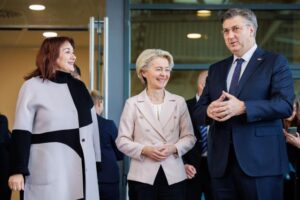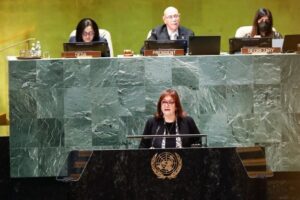As the Vice President for Democracy and Demography of the European Commission I have had the privilege of working on a wide range of important issues, for Diplomacy&Commerce says Dubravka Šuica Vice President of the European Commission. We should work to adapt social protection systems to adequately respond to the needs of older citizens while reducing the risk of poverty and social exclusion. Also, with the Conference on the Future of Europe we opened up a conversation and provided a platform for citizens to shape EU policies and governance, says Šuica.

- This year, Croatia celebrates 10 years of membership in the EU. How would you rate the first 10 years of membership?
Croatia’s accession was important both for the country and the EU as a whole and in the last ten years through the significant strides across a number of areas we have seen why. Croatia successfully aligned its legislation with EU standards, it has continued promoting the principles of democracy, human rights, and the rule of law. Croatia’s economy grew in the improved conditions for sustainable growth, and accession to the Eurozone helped this as well. EU funds and financial instruments supported improving business environment, enhancing competitiveness, and attracting foreign direct investment. Croatian citizens also benefited and now enjoy the rights and opportunities including the freedom to live, work, and study in any EU member state. Cross-border cooperation and borderless travel, in particular since accession to Schengen, educational exchanges, and cultural interactions have all enriched the lives of both Croatians and fellow EU citizens. All of this has been achieved during a time of several overlapping crisis from COVID to Russian aggression on Ukraine and energy crises. So, Croatia can be proud of the achievements of the past ten years.
- The development of countries is a constant and continuous process, but progress can be seen in advance. In which segments of society and the country do you see the greatest progress in Croatia, as a benefit of the first 10 years of membership, and where do you think there is still room for advancement?
I see very good progress in various areas since joining the EU. One example is infrastructure development. There have been substantial investments in transport networks, including highways, bridges, and railways, improving connectivity, and contributing to trade, tourism, and regional integration. Another area is environmental protection and sustainable development. Croatia has implemented EU environmental legislation and has taken measures to preserve its natural resources, promote renewable energy sources, and ensure responsible waste management. However, there is still room for advancement in certain areas. One area of concern is demography. Like many other countries in the EU, Croatia is faced with outward migration which has to some extent been facilitated by the greater openness to the EU. This challenge can be turned into an opportunity through smart specialization and using EU actions like the Harnessing talents initiative which is designed to support EU regions in becoming more competitive. Continued efforts and reforms as well as strengthening the rule of law are essential to ensure a fair and transparent legal framework, foster investor confidence, and promote a level playing field for businesses, all of which will also help with enhancing returns and promote brain circulation with people coming back and creating jobs in Croatia.

- The responsibilities you have as the vice-president of the EC are numerous. What would you single out as your biggest success so far in that position?
As the Vice President for Democracy and Demography of the European Commission I have had the privilege of working on a wide range of important issues. It is challenging to single out one specific success, so I will highlight some of the significant areas I worked on. For example promotion and advancement of participatory democracy within the European Union, done through the Conference on the Future of Europe. We have made big steps in enhancing citizens’ involvement in policy-making processes and ensuring that their voices are heard. Through the Conference, we have provided a platform for citizens, stakeholders, and civil society organizations to actively contribute their ideas, concerns, and visions for the future of the European Union. The Conference has allowed us to better understand the aspirations and expectations of citizens. And we continue to work on this to actively involve citizens also through the European Citizens Panels, through which we are fostering a more democratic and inclusive Europe. Most important is the inclusion of youth and children, who, are already active agents of change in the here and now. For these reasons I am also proud of my work on the first ever EU Comprehensive Strategy on the Rights of the Child, which is considered a landmark achievement on child rights also globally. We set clear norms and made concrete proposals which we are, implementing. One of these deliverables is the European Child Guarantee, to address child poverty across the EU. I have seen with my own eyes how well it works in Croatia! I need to mention that both the strategy and the guarantee were developed with children. Over 10,000 children from inside and outside the EU contributed to both initiatives, as well as to our Better Internet for Kids Strategy from 2022. We are building on this by setting up a permanent on- and offline EU Child Participation Platform to enable children across the EU to participate in EU policy-making in a systematic and meaningful way. This work also extends beyond the borders of the EU, with our first Youth Action Plan in EU External Action, to better empower, engage and connect young people across the globe. I believe that, if we wish to strengthen our democratic resilience from within, we need to start with our you and youngest generations.
In addition to working for the benefit of children, through my work on demography I have strived to address the demographic challenges facing the European Union, such as an aging population and declining birth rates. I led the work on policies and initiatives aimed at supporting active and healthy aging, promoting intergenerational cooperation, and ensuring adequate social protection systems. This includes establishing a baseline through two Reports on the Impact of Demographic trends in 2020 and 2022 a Green Paper on ageing, followed by the European Care strategy. I have also tried to ensure that our policies respond to the needs of the evolving demographic landscape of the EU and that we make sure we leave no one behind, no matter where they live. This was the rationale behind the Long Term Vision for rural areas with which we promote provision of services and jobs in rural areas to make them more vibrant and prosperous. The Harnessing talents in EU regions initiative I worked on supports the EU regions in becoming more attractive places to live through smart specializations.
I wish to convey that I firmly believe that investing in and empowering our citizens, our children, revitalising care, harnessing Europe’s human capital, and generally devising effective demography policies is an investment in our economies, in our societies, in our people, for the benefit of present and future generations.

- Statistical mapping of the effect of demographic changes is one of the most important responsibilities you have taken on. What are the results of that mapping and what is their application?
I mentioned the two Reports on the impact of demographic change the Commission issued under my leadership. They provide valuable insights into population dynamics, and aging trends. They are enabling us and other decisions makers at all levels to make evidence-based policy and plans. One of the key findings of is the fact that our population is aging. Europe is experiencing a significant shift in its population structure, with declining birth rates and increasing life expectancy. This demographic shift poses challenges for social security systems, healthcare, and the labor market. The aging population has implications for the labor market, including labor shortages and a shrinking workforce, which could lead to potential challenges in sustaining economic growth and maintaining social welfare systems. Addressing this issue requires policies that encourage active aging, support lifelong learning, and promote the participation of older workers in the labor market. As the proportion of older adults increases, there is a greater demand for healthcare services, long-term care, and support systems. This includes adapting social protection systems to address the needs of an aging population and ensure the sustainability of provision of care and this was also the focus of our work on the Care strategy.
- The population in all of Europe is aging. You also invest additional energy in ensuring that European social protection systems adequately respond to the needs of an aging population and reduce the risk of poverty. What are the mechanisms you propose?
The aging population poses challenges and opportunities for our societies and economies. We should work to adapt social protection systems to adequately respond to the needs of older citizens while reducing the risk of poverty and social exclusion. As the European Commission, we support the Member States who have the primary responsibility for social systems. To address these complex challenges, we need to have a multi-dimensional approach. Firstly, promoting active and healthy aging by investing in healthcare, preventive measures, and long-term care services. We should also build in flexibility in our labor markets and encourage active participation of older workers, promote lifelong learning, and ensure fair access to employment opportunities. All of these efforts could contribute to guaranteeing income security and adequate support for the elderly. Moreover, we should foster inclusive societies, promoting active citizenship and encourage intergenerational solidarity, recognizing the valuable contributions of all age groups to our societies. This way we could tap into the skills, knowledge, and experiences of older individuals, benefiting both the individuals themselves and society as a whole.

- You led the work of the Commission on Participatory Democracy and the Conference on the Future of Europe. The idea is that people can participate in shaping the way the EU is governed and the measures the EU takes. How satisfied are you with the response and how aware are people of the fact that they can really shape some policies that concern their lives specifically?
With the Conference on the Future of Europe we opened up a conversation and provided a platform for citizens to shape EU policies and governance. We tried to engage people, above all youth, from ages 16 to 86 directly in policy-making processes, ensuring that their voices are heard and taken into account. This was a major landmark for citizen inclusion at the EU level. In this respect, we can be very satisfied with what has been achieved. There was a high level of participation, with citizens, stakeholders, and civil society organizations actively contributing their ideas, concerns, and visions for the future of the European Union. It also fostered a real sense of ownership and democratic participation for those involved. However, there is room for further growth. We have to continue our communication and outreach efforts to ensure that all European citizens, regardless of their background or location, have access to information, opportunities for dialogue, and channels to express their views.